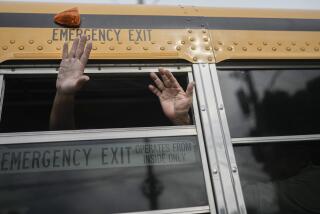Myanmar president announces prisoner release before Obama visit
NEW DELHI -- In an apparent goodwill gesture days before the arrival of President Obama in Myanmar, the country’s president Thursday released 452 prisoners, although it wasn’t immediately clear how many had been jailed for their political views and how many were common criminals.
According to the state-run New Light of Myanmar newspaper, President Thein Sein ordered the amnesty “on humanitarian grounds” to spur friendship with neighboring countries and in hopes that those released would recognize the goodwill of the state and “do their bits in nation-building tasks.”
“I welcome the release of any prisoners, especially political prisoners,” said Tint Swe, chairman of India’s Burma Center Delhi, while adding that the timing is a bit obvious. “Whenever there is an international visitor coming, these so-called positive moves come out of the military regime. It can be interpreted that political prisoners are a sort of ransom.”
By some counts, Myanmar, also known as Burma, held an estimated 300 political prisoners before the latest amnesty, down from as many as 2,000 a year ago. A September release of 500 prisoners, including several dozen political dissidents, was meant to please the U.S. as well, human rights group say, timed just before Thein Sein’s landmark U.S. visit.
From Myanmar’s standpoint, prisoner releases offer at least two benefits, analysts said. Each one suggests another step on the road to democratic reform as the world looks for progress. And they can be interpreted as a win for reformers over hard-liners, though it is sometimes difficult to make that distinction in an often opaque system, said Jan Zalewski, London-based South Asia analyst with the consultancy IHS Global Insight.
“It’s likely that there will be further such amnesties in the near future,” she said, “as they are a low-cost means of demonstrating ‘reform.’”
Thursday’s announcement, however, will only go so far in improving relations before Obama’s arrival, analysts said, given that sectarian violence between minority Muslim Rohingya and majority Buddhist Rakhine in western Myanmar is likely to top the visit’s human rights agenda.
Since June, dozens of people have been killed and tens of thousands -- mostly Muslims --- left homeless in tit-for-tat attacks in impoverished Rakhine state. Myanmar refuses to recognize the Rohingya, who are officially stateless. At best, critics say, the government has failed to address the crisis; at worst, it has fanned the violence for political reasons.
Obama’s planned visit to Myanmar is part of a four-day Asia swing Nov. 17-20 that will also take him to Cambodia for a regional security meeting and to Thailand.
Samantha Power, special assistant to Obama, said in a blog post last week that the trip aims to recognize and encourage Myanmar’s efforts at reform.
But Bo Kyi, joint secretary of the Assistance Assn. for Political Prisoners, an exile activist group based in Thailand, said that group’s information suggests that few if any of those released Thursday were political prisoners.
“The Burmese government is not sincere,” he said. “If it were sincere, it would be willing to have true peace and reconciliation, which isn’t possible without a solution on the ethnic minority and Rakhine state problems.”
Thursday’s prisoner release is part of a series of reforms enacted since Thein Sein’s nominally civilian government ended decades of authoritarian rule by easing media restrictions, liberalizing foreign investment rules and allowing multi-party elections.
These have seen opposition leader and Nobel Peace Prize laureate Aung San Suu Kyi elected to parliament. The military, however, retains 25% of the body’s seats, key veto power and control of key ruling bodies.
ALSO:
Austerity measures are protested across Southern Europe
High-ranking Mexico police officer arrested in CIA attack case
Israel’s killing of Hamas military chief leaves Egypt in quandary
More to Read
Sign up for Essential California
The most important California stories and recommendations in your inbox every morning.
You may occasionally receive promotional content from the Los Angeles Times.










